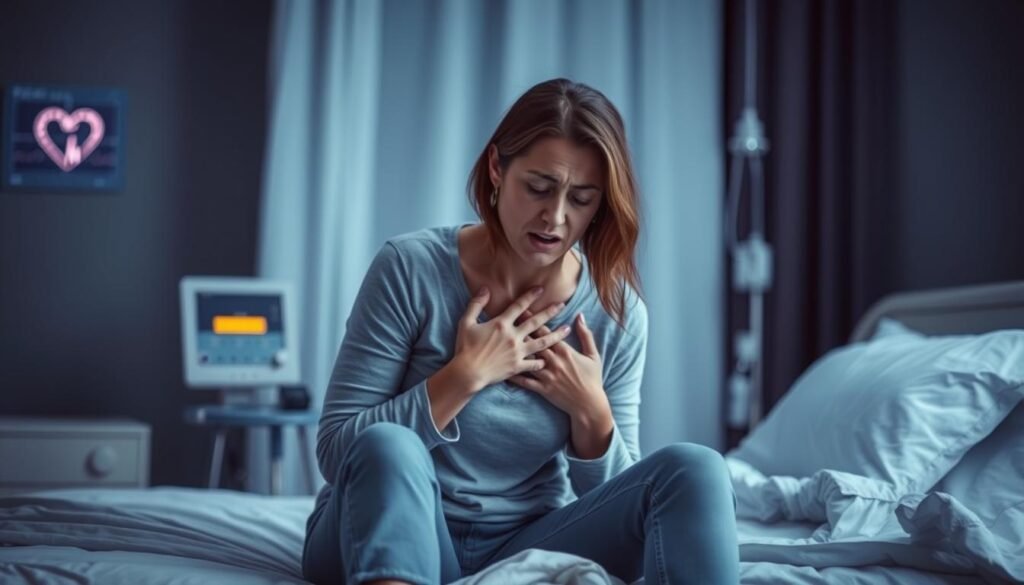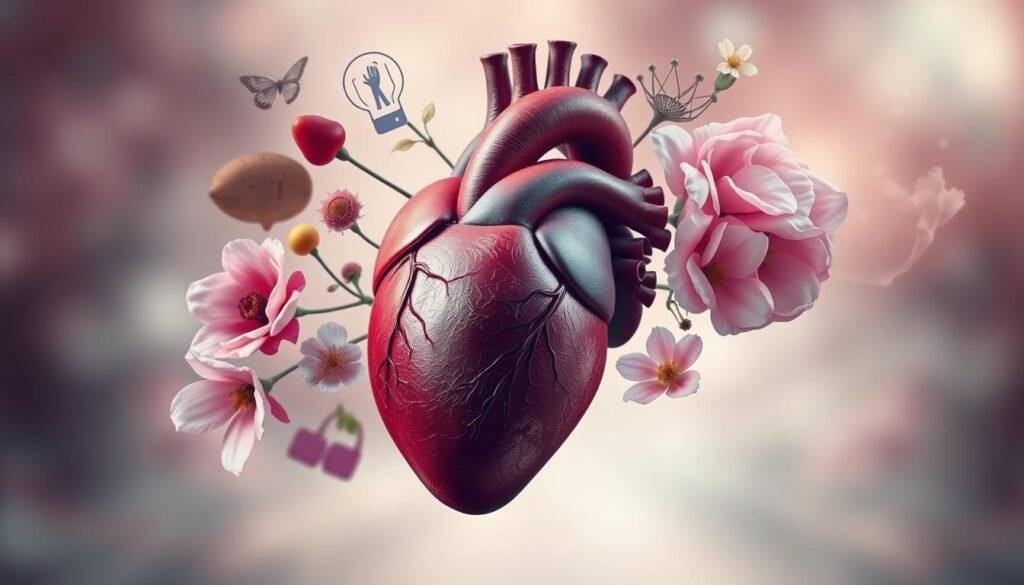Did you know that 80% of women feel symptoms before a heart attack? They notice these signs four weeks before the attack. This fact highlights the importance of knowing symptoms of both anxiety and mini heart attacks in women. Since the COVID-19 pandemic, more women suffer from anxiety disorders. It’s vital to tell the difference between anxiety and mini heart attack symptoms.
Symptoms like heart palpitations, chest tightness, and shortness of breath are common. However, these symptoms are often misunderstood. This misunderstanding can delay getting help during a dangerous situation. Spotting these signs can save a life.
Key Takeaways
- 80% of women experience symptoms before a heart attack.
- The prevalence of anxiety disorders in women has risen post-pandemic.
- Common symptoms include heart palpitations and chest tightness.
- Recognizing overlapping signs is imperative for health.
- Seeking medical attention early can save lives.
Understanding the Difference Between Anxiety and Heart Attack Symptoms
It can be hard to tell anxiety and heart attack symptoms apart. People often feel chest pain, heart flutters, and breathe harder in both cases. It’s especially tricky for women, who might show a wider range of symptoms. This makes figuring out what’s happening important.
Doctors say knowing the difference between anxiety and heart attack symptoms is key. Anxiety might bring chest pain, a fast heartbeat, sweating, and breathing issues. These signs can get worse, leading to a fear of disaster, weakness, or feeling faint.
Heart attack signs, though, often involve chest pain or pressure that spreads to the arms, neck, or back. People may also feel very tired, struggle to breathe, or get sick to their stomach. The timing is different too. Panic attacks are brief, lasting minutes to an hour, but heart issues might linger or come and go.
- Panic Attack Signs:
- Chest pain
- Pounding or racing heart
- Trouble breathing
- Sweating
- Feeling of impending doom
- Heart Attack Indicators:
- Chest pain or pressure
- Pain radiating to the arms, neck, or jaw
- Cold sweats
- Shortness of breath
- Nausea or vomiting
Both issues come from stress, but they have different triggers and pain spots. Anxiety might also up the risk for heart problems. This shows why it’s vital to get help right away when certain signs pop up.
Common Symptoms of Mini Heart Attacks in Women
It’s essential to know the symptoms of a mini heart attack for quick action and treatment. Women might experience different signs that can change in how strong they feel and how they appear. Knowing these signs can help get medical help fast when needed.
Chest Pain and Discomfort
Chest pain is a key sign of heart attacks, but it can differ for women. It might feel like pressure and last for more than 10 minutes. Women’s pain might not be sharp. Instead, some feel a dull ache or extreme fatigue before it happens. Pay attention to unusual chest pain.
Fatigue and Weakness
Many women report feeling really tired before a mini heart attack. This weakness could last for weeks, making daily tasks hard to do. This exhaustion is often confused with stress. Yet, knowing it’s a sign of heart trouble is important for quick action. Recognizing fatigue as a warning can save lives.
Shortness of Breath
Feeling out of breath without exercise is a major alert for a mini heart attack. This sign may come alone or with others. When it happens suddenly, it’s time to see a doctor right away. Knowing that shortness of breath is a sign will help women get help faster.
It’s crucial to know these signs in women for their safety and healing. More details about the difference between panic and anxiety attacks can be found here.
Recognizing Anxiety Symptoms That Mimic Heart Attack Indicators
Anxiety can make you feel like you’re having a heart attack. You might feel your heart pound, chest tighten, get dizzy, or feel sick. This happens because stress can make your body react like it’s in danger.
It’s tricky because anxiety and heart problems feel similar, especially in women. Women sometimes have different heart attack signs. So, they might think it’s just anxiety when it’s heart trouble. Knowing the difference is key to handling the situation right.
- Heart Palpitations: Anxiety can make your heart race, feeling like a heart attack.
- Chest Tightness: Anxiety often makes your chest feel tight, similar to heart attack pressure.
- Dizziness: Feeling lightheaded from anxiety can be mistaken for heart problems.
- Nausea: Anxiety can cause sickness, adding to the confusion during a stressful moment.
Fear of these symptoms can be worse if you’ve had panic attacks. Almost 3% of U.S. adults deal with panic disorders each year. It’s important to understand these anxiety signs. This knowledge can help you take better care of your health. And it reminds you to get medical help when you feel strange.
| Symptom | Anxiety Symptoms | Heart Attack Symptoms |
|---|---|---|
| Heart Palpitations | Common in panic attacks | Can occur during heart problems |
| Chest Tightness | Often associated with anxiety | Typical symptom of heart attack |
| Dizziness | Frequent during anxiety episodes | Possible in heart conditions |
| Nausea | May occur with anxiety attacks | Can be a heart attack symptom |
Understanding the small differences is super important. This is especially true for women, as their symptoms can be unique. If you’re feeling something new or unexpected, talking to a doctor right away is the best step.
Anxiety Female Mini Heart Attack Symptoms
Panic attacks often lead to confusion, especially in women with anxiety symptoms. The confusion comes when symptoms look like heart attack signs, causing a lot of worry. Understanding panic attacks is key, as they affect nearly 3% of U.S. adults yearly, mostly women.
This section will explain panic attacks and their symptoms related to anxiety.
Panic Attacks: An Overview
Panic attacks are scary episodes of fear that peak quickly. They make you feel extreme fear or like you’re losing control. Common symptoms include:
- Rapid heartbeat
- Shortness of breath
- Sweating
- Dizziness or lightheadedness
- Nausea
The symptoms of panic attacks can be similar to heart attack symptoms. This is especially scary for women, who often have less typical heart attack symptoms than men.
Physical Symptoms Often Associated with Anxiety
Some physical symptoms, like sweating, dizziness, and tiredness, might be caused by anxiety, not a heart problem. It’s important to recognize these signs. This is because panic attacks can get worse if not addressed.
The table below shows common symptoms of anxiety and heart attack signs for comparison:
| Symptom | Associated Condition |
|---|---|
| Chest Discomfort | Panic Attack |
| Shortness of Breath | Heart Attack |
| Dizziness | Panic Attack |
| Nausea | Heart Attack |
| Rapid Heart Rate | Both Conditions |

There are effective treatments for anxiety-related episodes. These can help people feel calm again. It’s key to know both panic and heart attack symptoms for the right treatment.
How Stress Can Contribute to Heart Problems
Stress greatly affects our heart health. It changes how our bodies work and can lead to big health problems. It’s very important to know how long-term stress sets the stage for heart issues. Learning to handle stress is key, especially for women. They have different risks.
Impact of Chronic Stress on Heart Health
Long-term stress harms our hearts in many ways. It can cause:
- Elevate blood pressure
- Raise cholesterol and triglyceride levels
- Increase blood sugar
- Contribute to unhealthy coping mechanisms, such as smoking
Work stress costs about $190 billion a year. Mental health issues like depression add $211 billion more. These huge numbers show how common stress is. They also show the big impact it has on us and on society.
Women’s Increased Vulnerability to Stress-Related Issues
Women face special stress and heart health challenges. Their bodies and society’s expectations can make them more open to stress problems. Jobs with high demand and low control increase heart disease risk. For women, long-term stress can lead to serious anxiety and even sudden heart problems.
A strong support network helps lower stress. It also helps women deal with heart disease risks better. Staying active is crucial too. Working out for 150 minutes a week helps control weight, improve cholesterol, and boost heart health.
Factors Contributing to Heart Attacks in Women
It’s vital to understand why women face heart attacks. Certain risks, like age and hormones, affect their heart health. By keeping an eye on these heart attack risk factors for women, we can lower these risks. This helps ensure better health for their hearts.
Age and Hormonal Changes
For women, getting older, especially after menopause, means a higher risk of heart disease. This is because of the hormonal changes, like the decrease in estrogen. Estrogen helps ward off heart disease; without it, heart risks go up. Knowing about age risk shows the increased chance of heart attacks as women age.
Family History and Other Risk Factors
A strong family history of heart disease means women may inherit these issues. If heart problems run in the family, women are more likely to have them too. Besides genetics, high blood pressure, cholesterol, diabetes, and lifestyle choices play a role. Conditions like endometriosis, autoimmune diseases, or complications from pregnancy also increase risks. Being aware and managing these issues can greatly improve health outcomes.

For more on heart disease in women and how these factors mix, visit Cleveland Clinic.
The Importance of Monitoring Mental Health for Heart Health
It’s key to see how mental health and heart health are linked for our well-being. Studies show mental issues like anxiety greatly impact women’s heart health. Symptoms such as chest pain in young women may link more to mental health than heart problems.
Over one-third of adults in the U.S. report feeling depressed. This points out how common mental health challenges are. For heart health visits, mental disorders make up more than 40% of cases. This fact is especially worrisome for young women and their heart risks.
There’s a big gap in mental health care, with over 70% not getting the help they need. This gap can lead to worse mental health and increase heart disease in women. So, mental check-ups should go hand in hand with physical ones. This whole-health approach is crucial.
Making mental health a priority can lead to better health overall. Talking more about mental and heart health raises awareness. This can improve how we care for heart disease in women. For more info, check out this link about the mental-heart health connection.
When to Seek Medical Attention
Knowing when to get medical help can save lives. It’s very important for women to know the emergency symptoms of heart attacks. These include chest pain, difficulty breathing, and extreme tiredness. Quick action can make a big difference.
Recognizing Emergency Symptoms
Heart attack signs in women can be different. They may have jaw pain, feel sick, or sweat a lot without chest pain. Knowing these less common signs is important.
- Back or jaw pain
- Nausea and lightheadedness
- Unusual fatigue
- Shortness of breath
Being aware of these emergency symptoms can help save lives. It’s key to get help fast for the best chance at survival.
Importance of Immediate Care
Fast action is crucial during a heart attack. Waiting too long can be deadly. It’s especially important for women to act quickly. Symptoms can start suddenly and get worse fast. The best move is to seek help right away. Remember:
- Seek help immediately if symptoms persist.
- Do not hesitate to call emergency services.
- Inform medical personnel about any known risk factors.
Women might not show typical heart attack signs. This can delay asking for help. Acting fast at the first sign can greatly help survival and recovery.
Preventative Measures for Heart Health in Women
Taking steps to keep your heart healthy is very important, especially for women. Women have a higher risk of heart disease. It’s critical to get regular check-ups and make healthy changes. These can greatly lower the chances of heart problems.
Regular Health Check-Ups
Going for regular check-ups helps keep an eye on your heart. Doctors check your blood pressure, cholesterol, and if you have diabetes. Catching these issues early can make a big difference. Women should see their doctors at least once a year. This way, you can make the right changes or start treatments early.
Lifestyle Changes to Reduce Risk
Changing how you live can greatly improve your heart’s health. Here are some important changes to make:
- Smoking cessation: Stopping smoking lowers your risk of heart disease and stroke a lot.
- Healthy diet: Eating more fruits, veggies, and whole grains can cut down bad cholesterol.
- Regular physical activity: Exercising for 150 minutes a week keeps your blood pressure and weight in check.
- Weight management: Losing 5% to 10% of your weight can boost your heart health big time.
- Stress management: Finding ways to relax and doing things you enjoy helps reduce stress levels.
- Limit alcohol: Keeping alcohol to one drink a day can lower heart risks further.
Keeping these preventative steps in mind is key to better heart health. Women should use these tips to protect their hearts effectively.
Seeking Help for Anxiety Disorders
Anxiety disorders are a big issue for well-being. Women face these disorders more than men. They deal with panic attacks, ongoing worry, and fear of social situations. Getting the right anxiety disorders help often means reaching out for professional advice.
Treatment like talking therapy and medication are key. They help manage anxiety by teaching coping skills and reducing symptoms. Mental health experts offer support, helping understand and face these challenges better.
It’s crucial to pay attention to mental health, just like we do with physical health. Regular health check-ups and talking openly with doctors about mental health can improve wellness. The link here has information on telling apart anxiety from possible heart issues.

Building support networks is vital in fighting anxiety. Emotional backing from loved ones is key. Plus, knowing the signs of anxiety can prompt early help, lowering heart risks from untreated anxiety.
| Treatment Type | Description | Examples |
|---|---|---|
| Psychotherapy | Talk therapy focusing on individual experiences and thoughts. | Cognitive Behavioral Therapy (CBT), exposure therapy |
| Medication | Pharmacological treatment for managing symptoms. | SSRIs, benzodiazepines |
| Support Groups | Group therapy with individuals experiencing similar issues. | Anxiety community groups, workshops |
Seeking help can greatly improve life quality. By recognizing and supporting mental health, women can better handle anxiety and safeguard their heart health.
Conclusion
This guide helps understand anxiety symptoms and female mini heart attacks. It shows the need to know a wide range of symptoms. About 62% of women have different signs other than chest pain during a heart attack.
Mental health is key to heart health. Anxiety can make heart rates go up, and cause palpitations and shortness of breath. These are similar to mini heart attack symptoms. It’s important to get regular check-ups for both mental and physical health. You can learn more from the summary of anxiety and heart attack.
To live better and lower heart disease risk, women need to be aware and seek help fast. Knowing unique symptoms and getting expert advice can improve health and wellness. For more details on recognizing and handling these symptoms, check out recognizing mini heart attack symptoms.